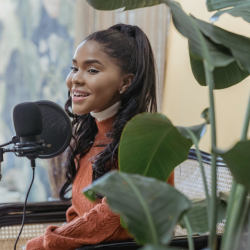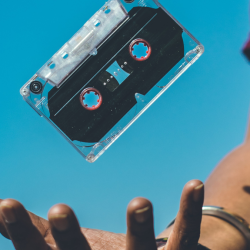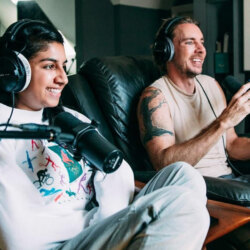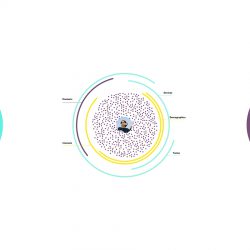In this interview MediaCat Magazine’s Exec. Editor, Mike Piggott, chats to Director Alex Jungius at This Is Distorted, an award-winning production company, about the future of podcasting, visual podcasting, and which weird podcasts he recommends.
Initially we connected over podcasts for the magazine. With podcasting booming in the last few years, can you explain what it is about this medium that people find so appealing?

Most importantly, accessibility. Anyone can start a podcast and start creating audio content with very little in the way of equipment and with the seed of an idea. From the decent quality microphone in your phone to free editing software and hosting, your stories and messages can be out there in the world with no cost and little fuss. It’s easier for people to ‘have a chat’ than sit down and write an article or blog as it feels off the cuff and so less intimidating.
In a world of polished advertising and slick YouTube channels it’s much more real — the world is fed up with filtered, vanilla content. Podcasts make room for genuine connections and for people to get deeper into topics they are passionate about.
You joined This Is Distorted in 2013, leaving a successful career at one of the UK’s biggest media companies. What made you confident that audio was a solid route, especially at a time when many marketers had started to talk of its demise?
I left Global partly out of a desire to do something new. I’d been in mainstream radio and media for most of my career and I wanted a new challenge and the opportunity to decide my own path. The reality is, I’m not sure I was confident that audio was a solid route. I was excited by the unknown and believed we had a good model for pushing ‘direct to fan’ audio content. A bit of luck and a lot of hard work and it’s paid off, with our company growing every year for the last 10 years, and going from a team of 4 to 14.
The art of storytelling is the only form of communication in my eyes, and audio leverages personal stories better than any other medium.
What does the future of podcasting look like?
Podcasting, to me, is all about a personal connection, talking one to one with the listener and always having an unedited rawness to it. 2023 will be the year that podcasts truly break free of the feeds that have got them to where they are.
Yes, you’ll be able to subscribe to your favourite podcast on Spotify or Apple Podcasts for long-form connection but you’ll consume it just as readily on Youtube Shorts, TikTok and LinkedIn.
What does this mean for brands and businesses?
Every brand is a media company now whether they like it or not, and like mainstream media companies, they need true and authentic voices to communicate their message. Audiences are sole to every second of the day, and podcasts offer an authentic voice into the noise of mass market communication.
Podcasts are raw, vulnerable and human, and allow the creation of a more authentic follower base and community. Brands that are going all in on podcasting are creating a far deeper connection than a Superbowl ad.
The term ‘visual podcasting’ is used a lot lately, but what does it mean? How is it different to YouTube videos or TikTok reels?
For all the positives of podcasting, it’s always struggled with discoverability. Finding new content is hard, and the charts from Apple and Spotify compound matters further, highlighting shows that have large followings elsewhere and leverage those for listeners. That’s where visual podcasting comes in. As much as audio has always been my passion I understand that we all like things to look nice, and clips that catch our eye will draw us in more than a bouncing up and down sound wave. Visual podcasting leverages how most social media is consumed, visually. Clips, shorts, reels are all huge formats to attract new followers and listeners, so anyone not creating visual content better be planning to or having a huge marketing plan to plug the gap!
Visual content will find audiences in far more places but differentiate itself from other video content in its style, look and feel. (Editor’s note: see Higher Learning’s visual podcast below.)
Is the true beauty of podcasting becoming lost under the constant pressure for brands to be relevant and create content?
This is a good question. My feeling is no, it won’t ever be lost, and the ones done right will rise to the top. But I think there is always the danger of doing one for the sake of it, and not having a long-term goal for the podcast to achieve. Podcasting is about true connection, and that has to be understood to make best use of its unique style.
If anything, brands have been far slower to look at podcasting than they have at other trends in the last decade, and that’s because audio was for so long seen as boring and old hat. That has changed and ignoring audio from your communication channels now is short sighted.
With reports of a decline in the production of new podcasts, has the bubble burst already?
Podcasting is maturing and going from a real growth phase into a mainstream product, and what comes with that is growing pains. What I’d say is that the headlines are all about mainstream publishers slowing down on their podcast productions, due to the main economic pressures the world is facing at present. Outside of the big commercially-focused players the opposite is true. We as a company are receiving more enquiries, more briefs and more demand for audio first content than ever.
For a final question: do you have any weird, wonderful and offbeat podcasts you could recommend?
When you live and breathe podcasts it becomes harder and harder to recommend just a few, but I’ll give you one big one and one little one:
Science Vs
I’m a big science geek and this show is the best example I’ve ever heard of distilling complex subjects into bite size chunks that anyone can understand. It pits fact vs fiction and was dispelling fake news long before fake news was a thing. A brilliant and fun listen and very well produced.
Diary of a Space Archivist
A low budget but highly produced fictional podcast set in space. Think Hitchhikers Guide to the Galaxy meets Red Dwarf. An example of an independent podcast done with real purpose, and you can tell the love, care and attention that goes into making it.































